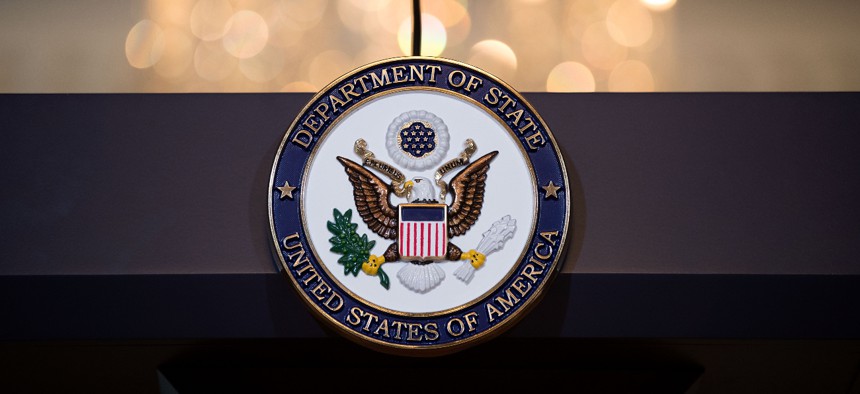
President Biden pledged to welcome 125,000 refugees into the country annually in fiscal years 2022 and 2023, but has fallen short of those goals. Drew Angerer/Getty Images
State Department Opens Up Refugee Sponsorship to Individual Americans
The Biden administration, having bemoaned its internal shortfalls, leans on others outside government to meet the president's lofty admission goals.
The Biden administration is launching new opportunities for individual Americans to house and support refugees as it seeks to fulfill its promise to drastically increase the number of foreign nationals it admits through the program.
The departments of State and Health and Human Service announced on Thursday it is standing up the Welcome Corps, an initiative through which vetted Americans who make certain promises can sponsor refugees coming into the country. State has historically only relied on nonprofit organizations to resettle refugees and officials called the change the most significant update to the program in 40 years.
President Biden has pledged to welcome 125,000 refugees into the country annually in fiscal years 2022 and 2023, but has consistently fallen short of its goals. State has cited the Trump administration’s cuts to its own workforce and efforts to dismantle the nonprofit resettlement community as cause for its shortfalls, but has vowed to rebuild the entire system. The Biden administration resettled just 25,000 refugees in fiscal 2022, far short of its goal but an improvement on the 11,000 it welcomed in fiscal 2021. In the first three months of the current fiscal year, State has resettled less than 7,000 individuals, putting it on pace to once again fall well shy of its target.
“We have a lot of rebuilding to do because the program was decimated by the previous administration,” Brian McKeon, the department’s deputy secretary for management and resources, told lawmakers in May. “The president has given us an ambitious target. We’re not going to hit it this year but we’ve got to make progress so we can hit it in the next couple years.”
The Biden administration hopes to identify 10,000 sponsors in the Welcome Corps’ first year, who can then sponsor 5,000 individuals. It aims for those refugees to begin arriving by June. State is handing off management and oversight of the program to a consortium of nonprofits that it will fund, senior government officials told reporters on Thursday. Sponsors will need to go through a screening process and put up $2,275 per refugee to provide initial support for the individual or family’s first three months, such as a security deposit for an apartment, new clothes and furniture. After that period, the refugees will become eligible for other federal assistance, though a senior official said the hope is they will have found jobs and become self-sufficient.
Sponsors are expected to help the refugees find work, enroll their kids in school, learn public transit options and generally transition into their new lives. The consortium will provide training to the sponsors and monitor the program to ensure refugees are receiving adequate support. State is so far funding six partner organizations to run the program, a senior government official said, who are leaning on existing staff or hiring up for the new initiative. The International Rescue Committee, one of the groups helping to stand up the program, called the Welcome Corps a “groundbreaking new initiative” that will “promote a culture of welcoming refugees.”
While distinct from existing programs, senior officials said a similar parole initiative that helped welcome displaced Ukrainians, Afghans and others has proven a successful test case. Unlike those programs, refugees will receive permanent legal residence and many will ultimately become U.S. citizens.
Officials said they are hopeful the program can help the Biden administration come closer to meeting the president’s refugee admission goal, though they acknowledged it will not resolve the shortfalls on its own.
“In order to strengthen and expand our country's capacity to resettle refugees,” one official said on Thursday “the Welcome Corps is going to create new opportunities for everyday Americans across the country to directly support resettlement by enabling them to privately sponsor refugees from around the world through the U.S. Refugee Admissions Program.”
Other efforts underway include trying to speed up the vetting process and finding additional pathways for refugee referrals. In its second phase, the Welcome Corps will allow sponsors to themselves identify individuals to sponsor.
“It's gonna take a lot of work to get to that level,” an official said of Biden’s 125,000 refugee goal. “And it's going to take a lot of different initiatives, and we're doing a lot of different things at once. This program of private sponsorship is one of the aspects of getting to the president's target.”
Sarah Krause, executive director of the Community Sponsorship Hub, which will lead the Welcome Corps consortium, praised the initiative and said it will help offer important opportunities for Americans.
“Whether you are a business owner, teacher, stay-at-home parent, nurse, or store clerk, the Welcome Corps equips you with the resources you need to work together and share knowledge of your community with refugees as they adapt to life in America,” Krause said.
Those interested in enrolling in the program can do so at WelcomeCorps.org.







